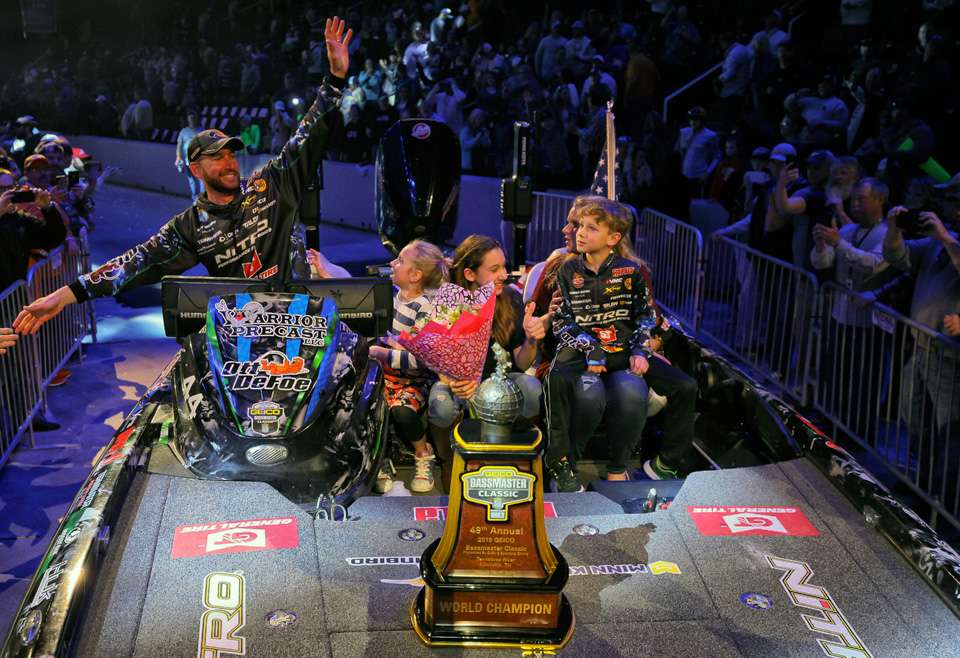
The Bassmaster Classic is always a great event, but each iteration is great in different ways.
After months of speculation about the Tennessee River, muted concerns about the departing anglers, and general questions about whether it could beat out prior years’ efforts, we were treated to one for the ages in Knoxville. Any other year, Ott’s dramatic win, Zaldain’s go-big-or-go-home approach and Matthew Robertson’s Ric Flair act would’ve stolen the show, but this year a little girl snuck in and stole our hearts and our collective breath instead.
As DeFoe’s family gathered onstage to celebrate a victory in what might prove to be his last Classic, master of ceremonies Dave Mercer asked Ott’s young daughter Lizzie what she thought of her father’s win.
“I wanted him to win because I think he’s the best daddy in the world,” she said clearly. Then, seemingly realizing the importance of the moment, she collapsed into tears and into her parents’ arms.
Twenty thousand fans cried with her.
When I look back on the 2019 GEICO Bassmaster Classic presented by DICK’S Sporting Goods, it won’t be the sport’s tumult that I recall. It might not even be the tournament itself.
Instead, it will be tears and emotional vulnerability.
That started for me on Media Day, when I pursued a story about Aaron Martens’ quest for a Classic trophy after multiple painful near misses. First, Carol, Aaron’s mom, told me about him crying as they drove home from the U.S. Open a few decades ago, convinced that he’d let the trophy slip through his hands and that he’d never have another shot at it. He went on to win it multiple times. Then I asked Skeet Reese to opine on what he felt might be going through A-Mart’s mind. In order to put Skeet in a frame of mind where he could empathize, I asked him about the two years where he’d led the Angler of the Year race at the end of the regular season before losing the title in the small-field postseason.
“Those two years absolutely crushed me,” Reese replied. “I went into a deep depression after that. I struggled. The tipping point for me was a lot of therapy. I had to go through it so I could understand who I am and why I am thinking certain things.”
I asked him if that was on the record. After all, in this sport full of alpha male individualists, few competitors ever show any weakness or fear. On the occasions that they have – like when Jeff Kriet admitted at the 2010 Classic that he’d seen a sports psychologist – people tiptoed around the information gingerly.
Skeet’s response was unequivocal: “Absolutely,” he said, adding that the topic needs to be discussed more frequently and more openly. Later that day, at the Night of Champions banquet, he asked why I’d looked so surprised. All I could say was that in hundreds of interviews I’d never had a pro angler talk about such a sensitive subject.
While Mike Iaconelli stated a few weeks ago on social media that he’d been seeking treatment for depression, I assumed that he was an emotional outlier, the only one in the field who could wear such an admission on his sleeve. Indeed, I had never considered that the flip side of being a rugged individualist, in a field of individualists, is that you can feel lonely much of the time. That was eye-opening for me.
On the final day of the Classic, enlightened by Skeet’s words, I made it to the boatyard at 5 a.m. I didn’t strictly need to be there (and could have slept two more hours), but photographer Andy Crawford has an early assignment, and it seemed foolish not to get some Q&A time with the competitors at such a critical moment.
In the parking lot of the Hotel Knoxville I asked a few questions, but mostly I tried to read the anglers. I saw Clifford Pirch’s extreme concentration, Chris Zaldain’s brimming excitement, Roy Hawk’s quiet focus and the California-by-way-of-Alabama cool that permeates Justin Lucas. For so long I’ve thought that the range of emotions that matter in competition were limited in scope, but for the first time in my coverage of the sport I could see that each angler brings something different, and that the range from angler to angler and day to day is broad. There’s a full palette at work, and each pro harnesses those tools to enhance the ups and to cushion the downs.
The icing on the cake, of course, was little Lizzie DeFoe’s honest outburst and her family’s reaction. It’s ironic that in an event that produced more on-the-water coverage than any of its predecessors, the thing that I’ll remember most vividly is a moment that occurred when it was all over. It’s bound to become one of the sport’s iconic moments, up there with the tragedy of Jim Bitter’s lost fish, KVD’s leap in 2001, Takahiro’s “I knew it,” Chris Lane’s “Tebow” and Ike’s “never give up” war cry.
Ott’s daughter will no doubt be forced to relive that moment over and over and over again. It will eventually be seen by her high school peers, perhaps by her first boyfriend or her eventual husband. It’ll get replayed so much that she’ll become immune to its charm as well as to any embarrassment. I just hope that she never forgets how happy and powerful that moment was.
And I hope that future Classics come somewhere close to that level of emotional rawness.

